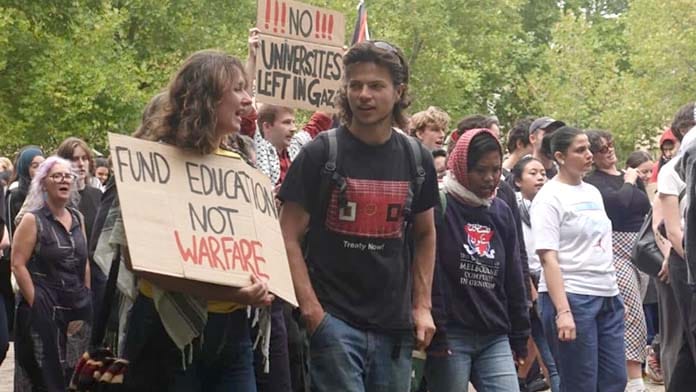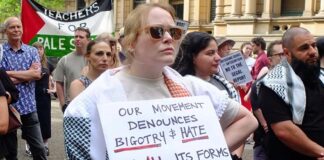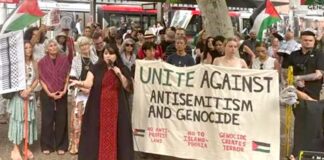Hundreds of students and staff rallied at universities nationwide on 26 March to defy the crackdown on protests, joining a National Day of Action for Palestine.
At the University of Melbourne (UniMelb) more than 300 students and staff rallied, defying new university restrictions on the right to protest. This was the biggest rally on campus since the student encampment last year.
The rally received widespread support, including endorsements from the National Tertiary Education Union (NTEU), BDS UniMelb, and Free Palestine Melbourne.
Emboldened by the turnout, organisers made the snap decision to challenge new protest rules by marching into Mahmoud’s Hall—the university building students occupied for ten days last year, forcing the university to disclose its ties to weapons manufacturers.
Over 100 people filled the hall. This significantly defied the university’s attempts to restrict the right to protest on campus, showing that mass mobilisation can challenge UniMelb’s attacks on Palestine protest and its complicity in the genocide.
On the first day of the academic year, new Vice-Chancellor Emma Johnston introduced rules that prohibit any protests inside buildings or near building entrances. These rules also ban any protests that are unreasonably disruptive or undermine individuals’ capacity to participate in university activities. The new restrictions are a direct response to the success of the Mahmoud’s Hall occupation last year.
NTEU branch committee member Sophie Rudolph told the rally that attacks on protest were a result of the, “Corporate university [which] is interested in maintaining the power of elites,” arguing that, “We must stand together and fight against that kind of repression.”
The announcement of the new protest rules coincided with Universities Australia adopting its new definition of antisemitism. This exposes students and staff to misconduct for any attempt to criticise Zionism or call for the end of the apartheid state of Israel.
“We refute this idea that this is what antisemitism is,” anti-Zionist Jewish scholar Dr Jordy Silverstein told the crowd. “We refute this idea that there is a hierarchy of racisms and that anti-Palestinian racism and Islamophobia don’t matter. We refute the idea that Palestinians don’t matter.”
Students diligently postered, stalled and lecture bashed to build the protest. Some were met with reluctance from staff members, despite their support for Palestine, who feared university reprimand.
But with Israel’s breaking of the ceasefire and continued bombing of Gaza, the outrage of students and staff on campus shows both the potential and necessity to mobilise for Palestine.
By Julie Monteiro
Students in Sydney win opposition to sham antisemitism definition
In Sydney, up to 80 people protested at the University of Technology Sydney (UTS), with students marching to join a crowd of over 100 at the University of Sydney (USyd).
Both rallies were a testament to the appetite to fight for Palestine that still exists on campuses. The rally at USyd was the largest on campus so far this year.
Since the encampment was forcibly ended last June, the university has unleashed a wave of repression. The Campus Access Policy (CAP) prohibits protests that do not follow the university’s strict notification scheme, and further proposals include a ban on lecture announcements and the display of banners.
The result has been that many students and staff are now afraid to publicly support Palestine. In this context, having a large and defiant rally was important.
Much more will need to be done to force universities to cut ties to Israel and drop their restrictions on the right to protest.
After the rally at USyd, a number of students received letters informing them they had breached the CAP by setting up a trestle table outside the administration building at the rally, and warning that any further breaches would constitute misconduct. The next week, the university hosted soldiers from the Israeli Defense Forces (IDF) in the board room of that same building.
At ANU, Palestinian and Jewish speakers also addressed the antisemitism definition. One student received a warning from the university for chanting “From the river to the sea, Palestine will be free”, which it says now violates the student code of conduct.
But students and staff can push back. On the day of the protest, UTS Vice-Chancellor Andrew Parfitt announced the university would not implement the new definition of antisemitism. UNSW has also refused to adopt it. But at USyd, an endorsement of the definition was hidden in the next Student News email.
Students Against War at USyd are in the process of organising a student general meeting to register official student opposition to the new antisemitism definition, call for an end to the crackdown on protest and demand an end to all ties to Israel.
By Angus Dermody






